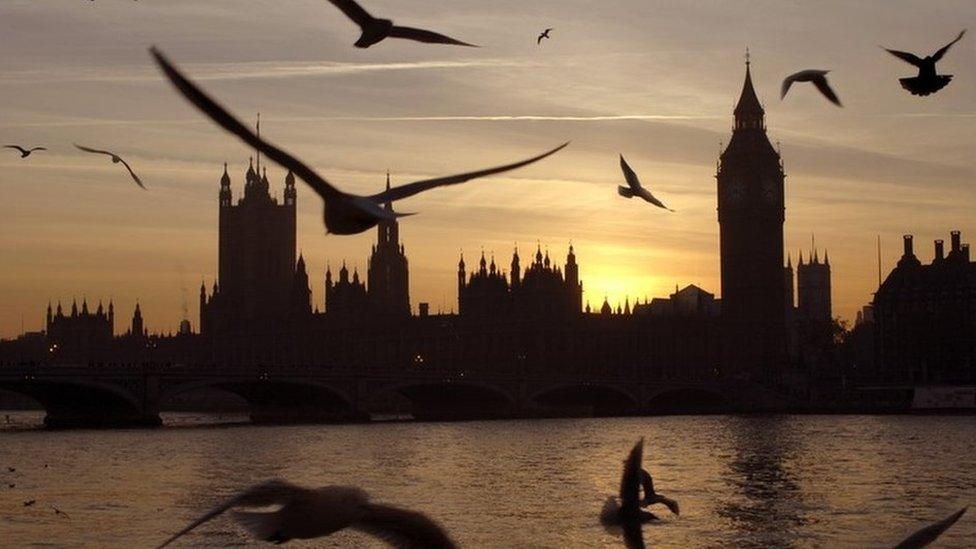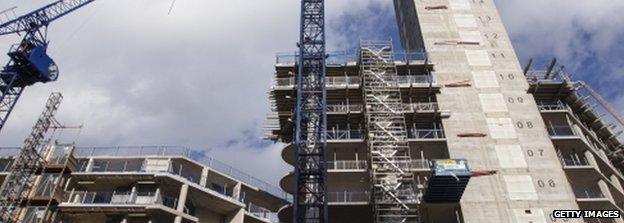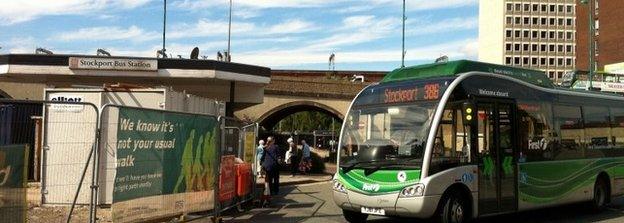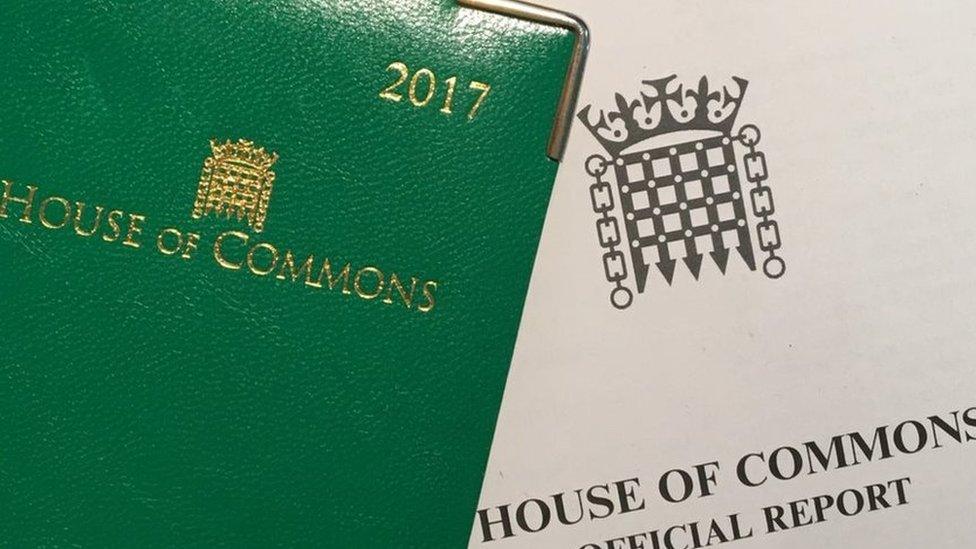General election 2017: What will happen to proposed laws?
- Published

The sun could set on a number of government bills
One of the knock-on effects of the snap election on 8 June is that the current session of Parliament is coming to an abrupt end.
The formal business will stop on Thursday, when the current Parliament is - to use its terminology - prorogued.
It will then be officially dissolved by the Queen on 3 May.
But before that happens, there will be a flurry of action as the fate of outstanding legislation is decided.
In what is known as the wash-up period, the Commons and Lords will decide what bills they want to let through and which they will effectively put out to grass.
Speaking on Monday, Commons Leader David Lidington said he hoped there would be a "swift and orderly conclusion" of parliamentary business.
One bill guaranteed to pass is the Northern Ireland Bill.
This is emergency legislation drafted to enable domestic rate bills to be calculated in Northern Ireland in the absence of a sitting assembly.
The bill, which will extend the period by which a functioning executive can be formed, in an attempt to resolve the current political deadlock, will be fast-tracked through Parliament on Monday.
Other bills that do not make the cut this time could be revived after the election should the Conservatives be re-elected.
Brexit looms
But with Brexit looming large on the horizon, the scope for other legislation in the next few years is expected to be substantially reduced.
Some of the bills may never see the light of day again.
Just as intriguing are the changes that MPs and peers may demand from the government's business managers in return for approving legislation.
In past years, these have often been quite substantial, with whole sections of bills removed or, in some cases, clauses added to salvage them as they "ping-pong" between the two Houses.
So which bills are still in the mix and what is likely to happen to them?

Finance (No.2) Bill (will pass)

The bill, which enacts measures included in Philip Hammond's Budget last month, will be given priority and is expected to be rushed through its remaining stages in the Commons on Tuesday.
As well as enacting changes to duties, the legislation - whose approval by the Lords is a formality - includes provisions on tax avoidance and tackling childhood obesity.

Higher Education and Research Bill (likely to pass)

This bill, which is designed to increase competition and choice in higher education and raise standards in research and innovation, has been agreed in principle by both the Commons and Lords.
But amendments have yet to be hammered out as part of the process of "ping pong".
Given ministers have been defeated in the Lords on issues such as the scope of degree-granting powers, it might require compromises to get on the statute book.
No date has so far been set for final consideration.

Health Service Medical Supplies (Costs) Bill (set to pass)

This bill is on its final lap, with MPs due to consider a single Lords amendment relating to the life sciences sectors on Tuesday.
The legislation is designed to bear down on the spiralling cost of NHS medicines and other medical supplies and secure "best value" for the health service and taxpayers.

Digital Economy Bill (likely to pass)

This wide-ranging legislation will entitle consumers to minimum broadband speeds, increase protection for intellectual property online, restrict access to online pornography, provide more scope for data-sharing within the public sector and increase the powers of Ofcom with regard to BBC regulation.
It has commanded cross-party support throughout and is likely to become law, pending MPs' consideration of Lords amendments on Wednesday.

The Criminal Finance Bill (uncertain)

There is not much time for this big bill, which begins report stage in the Lords on Tuesday, to become law.
Peers have tabled 50 amendments, which could slow things down, but if the government and opposition can agree, possibly by setting aside the most controversial aspects, it still has a chance of making it through.
It includes new powers to oblige suspects to explain the origin of their assets and for the authorities to seize the proceeds of crime stored in bank accounts or used to purchase property or jewels.
It would also create a new offence enabling companies facilitating tax evasion to be prosecuted as well as measures on combating terrorist finance.

Technical and Further Education Bill (likely to pass)

Peers are due to consider Commons amendments to this bill - which is designed to improve the quality of technical education and apprenticeships while addressing skill shortages - on Tuesday. If there is enough time, the bill is likely to pass.

Neighbourhood Planning Bill (likely to pass)

Peers are due to consider Commons amendments to this bill - which aims to identify and free up more land for homebuilding and speed up the delivery of new homes - on Tuesday. If there is enough time, the bill is likely to pass.

Bus Services Bill (likely to pass)

Peers are due to consider Commons amendments to this bill - which will give new powers to English local transport authorities to introduce franchising and new partnership arrangements and to offer multi-operator ticketing services - on Tuesday.

Prisons and Courts Bill (shelved)

The government has already admitted this bill, put forward by the former Justice Secretary Michael Gove before the EU referendum, will be shelved, at least temporarily.
This is after MPs and peers stated there was not enough time to scrutinise its contents - which included changes to prison inspections and the use of mobile phones by prisoners, a new online dispute resolution system for civil cases as well as changes to judicial appointments and compensation for whiplash injuries.

The Vehicle Technology and Aviation Bill (carried over)

This bill, which would, among other things, change the motor insurance system to prepare for the arrival of driverless cars and incentivise the take-up of electric vehicles, has also come to a halt for now.
It hadn't progressed far enough in the Commons and has yet to be even considered by the Lords.
A motion has been passed carrying it over to the next Parliament.
The Local Government Finance Bill has also been parked for another day.

Private Members Bills

A host of bills tabled by backbenchers are currently working their way through the legislative system. Most are likely to run out of time, but a handful that have the support of the government could possibly become law if the Lords gets around to approving them.
Guardianship (Missing Persons) Bill: Tory MP Kevin Hollinrake's bill would give the families of missing people greater control over their affairs. Dubbed Claudia's law, in memory of the chef Claudia Lawrence, who disappeared in 2009, it would establish a new legal mechanism to deal with the property and financial affairs of a missing person. Set to be debated in the House of Lords on Wednesday.
Merchant Shipping (Homosexual Conduct) Bill: Tory MP John Glen's bill would repeal aspects of the 1994 Criminal Justice and Public Order Act that suggest it would be lawful to dismiss a seafarer for a homosexual act. Set to be debated in the Lords on Wednesday.
Farriers (Registration) Bill: Proposed by Conservative Byron Davies but prepared by the Department for the Environment, this bill would alter the governance and membership of the Farriers Registration Council, which was set up in 1975. Set to be debated in Lords on Wednesday.
Local Audit Bill: This would allow journalists to examine the accounting records of local authorities and other public offices, including parish councils, police and crime commissioners, fire authorities and NHS clinical commissioning groups. Set to be debated in Lords on Wednesday.

Non-legislative changes
The early election could also mean delays to changes in the following areas.
Air pollution plan (publication delayed until September)
Boundary review of UK constituencies (put back until 2022 election)
The national funding formula for schools in England (consultation closed in March)
White Paper on grammar schools (due in June but could be delayed)
Consultation on industrial strategy documents (concluded on 17 April)
- Published24 April 2017
